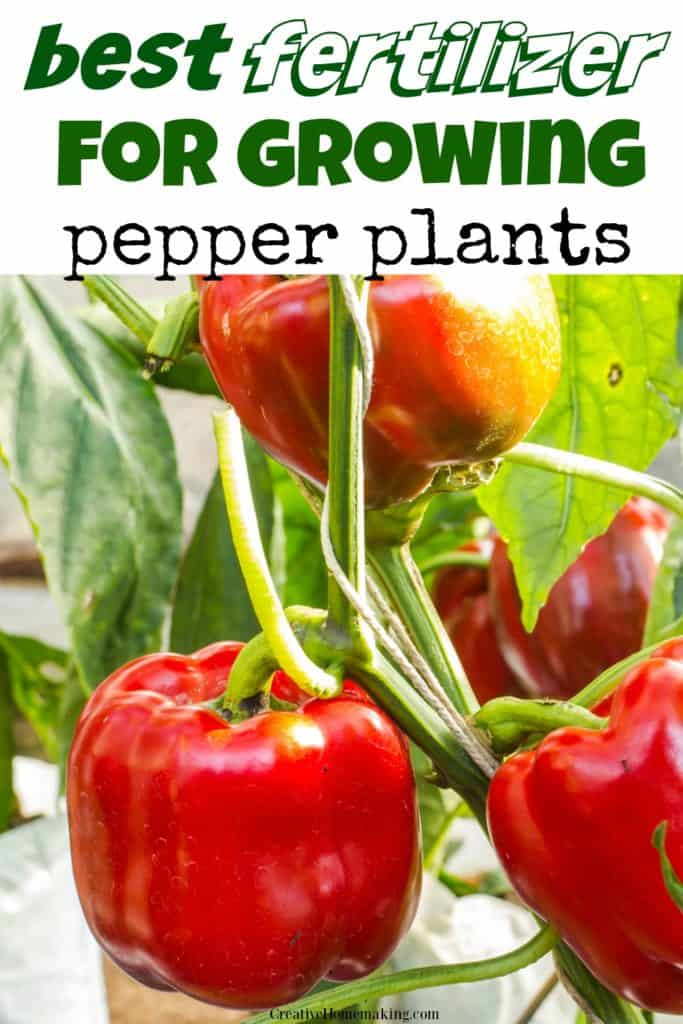Best Fertilizers for Peppers: Increase Development and Flavor Naturally
Best Fertilizers for Peppers: Increase Development and Flavor Naturally
Blog Article
Organic Vs. Synthetic Fertilizers: Which Is Best for Supporting Healthy And Balanced Pepper Plants?
In the world of nurturing healthy pepper plants, the option between artificial and organic fertilizers stands as an essential choice with far-ranging implications. While both alternatives purpose to provide crucial nutrients to support plant development, the subtleties of their impact on the dirt, plant health and wellness, and the atmosphere trigger a dispute that mirrors throughout the gardening community. Understanding the distinct benefits and possible pitfalls of each plant food type is vital for pepper growers looking for to optimize their yields while preserving an eco-conscious and sustainable method.
Advantages of Organic Plant Foods
Organic fertilizers offer an environmentally-friendly and lasting method to beneficial pepper plants, offering important nutrients without the use of synthetic chemicals. These natural plant foods are obtained from natural resources such as garden compost, manure, bone meal, and seaweed, advertising soil wellness and biodiversity. Unlike synthetic fertilizers, organic alternatives launch nutrients slowly, making sure a constant and balanced supply for pepper plants to grow.
One considerable benefit of natural fertilizers is their capacity to enhance dirt framework and water retention. By boosting dirt wellness, organic plant foods advertise valuable microbial task, which assists in nutrient uptake by pepper plants. Additionally, organic fertilizers decrease the risk of chemical run-off, securing water resources from air pollution and securing the environment.
Furthermore, natural fertilizers add to long-term dirt fertility by advertising the development of valuable dirt microorganisms. These microorganisms assist damage down organic issue, launching nutrients in a type that is easily obtainable to pepper plants. best fertilizers for peppers. By fostering a healthy and balanced dirt community, organic plant foods sustain lasting pepper growing practices that profit both plants and the atmosphere
Downsides of Artificial Plant Foods
Artificial plant foods, in contrast to their organic counterparts, pose numerous disadvantages when utilized to nourish pepper plants, influencing both plant wellness and environmental sustainability. One significant disadvantage of artificial fertilizers is their tendency to leach nutrients from the soil rapidly.
In addition, the overuse of synthetic plant foods can add to water air pollution. Excess plant foods not taken in by plants can remove into water bodies, bring about eutrophication, where algae flowers diminish oxygen levels in the water, harming marine life. Furthermore, artificial fertilizers are usually originated from non-renewable resources, such as fossil gas, contributing to carbon discharges and ecological deterioration throughout their manufacturing.
Nutrient Absorption Comparison
When comparing natural and artificial plant foods in terms of nutrient absorption, natural plant foods have the benefit of giving a much more balanced and slow-release resource of nutrients. Organic plant foods contain a range of macro and micronutrients that are not only helpful for the plants however likewise advertise healthy and balanced soil microbial task, which aids in nutrient uptake.
Furthermore, natural fertilizers improve soil structure and water retention capacity, enabling pepper plants to accessibility nutrients extra efficiently. This enhanced dirt top quality assists in root advancement, making it possible for better nutrient absorption. Synthetic fertilizers, although initially enhancing plant growth because of their high nutrient concentrations, may impede lasting nutrient absorption by degrading soil health over time.
Ecological Impact Considerations

On the other hand, synthetic plant foods, although typically more focused and immediately offered to plants, can have detrimental Continued results on the setting otherwise applied appropriately (best fertilizers for peppers). Their manufacturing calls for high power inputs, causing greenhouse gas emissions and adding to environment modification. The overflow of excess synthetic fertilizers can infect water resources, leading to eutrophication and harming aquatic ecological communities.
Best Fertilizer Practices for Peppers
When feeding pepper plants, optimizing nutrient uptake and lessening ecological impact are essential considerations. To attain this, it is necessary to comply with ideal fertilizer methods customized to click over here now the details demands of pepper plants. One essential practice is to carry out a soil examination before using any type of plant foods. This examination can figure out the pH level of the dirt and identify any type of nutrient deficiencies, directing you in choosing the most appropriate fertilizer formula.
One more crucial method is to fertilize pepper plants at the correct time. Generally, peppers take advantage of obtaining plant food at planting and after that again when they begin to blossom. Over-fertilizing can bring about nutrition discrepancies and hurt the plants, so it is vital to adhere to advised application prices.
In addition, choosing a well balanced fertilizer with an NPK proportion that suits pepper plants' needs is essential. Ultimately, incorporating synthetic and organic plant foods judiciously can assist support healthy and balanced pepper plants while reducing environmental impact.
Final Thought

Organic plant foods offer an environmentally-friendly and lasting approach to nourishing pepper plants, supplying important nutrients without the use of artificial chemicals. Unlike artificial plant foods, organic alternatives release nutrients gradually, making certain a stable and well balanced supply Click This Link for pepper plants to thrive.
Synthetic fertilizers, in comparison to their natural equivalents, pose various drawbacks when utilized to nurture pepper plants, influencing both plant health and environmental sustainability. When comparing organic and synthetic plant foods in terms of nutrient absorption, natural plant foods have the benefit of giving an extra well balanced and slow-release resource of nutrients.In addition, natural plant foods boost dirt framework and water retention ability, permitting pepper plants to accessibility nutrients extra successfully.
Report this page